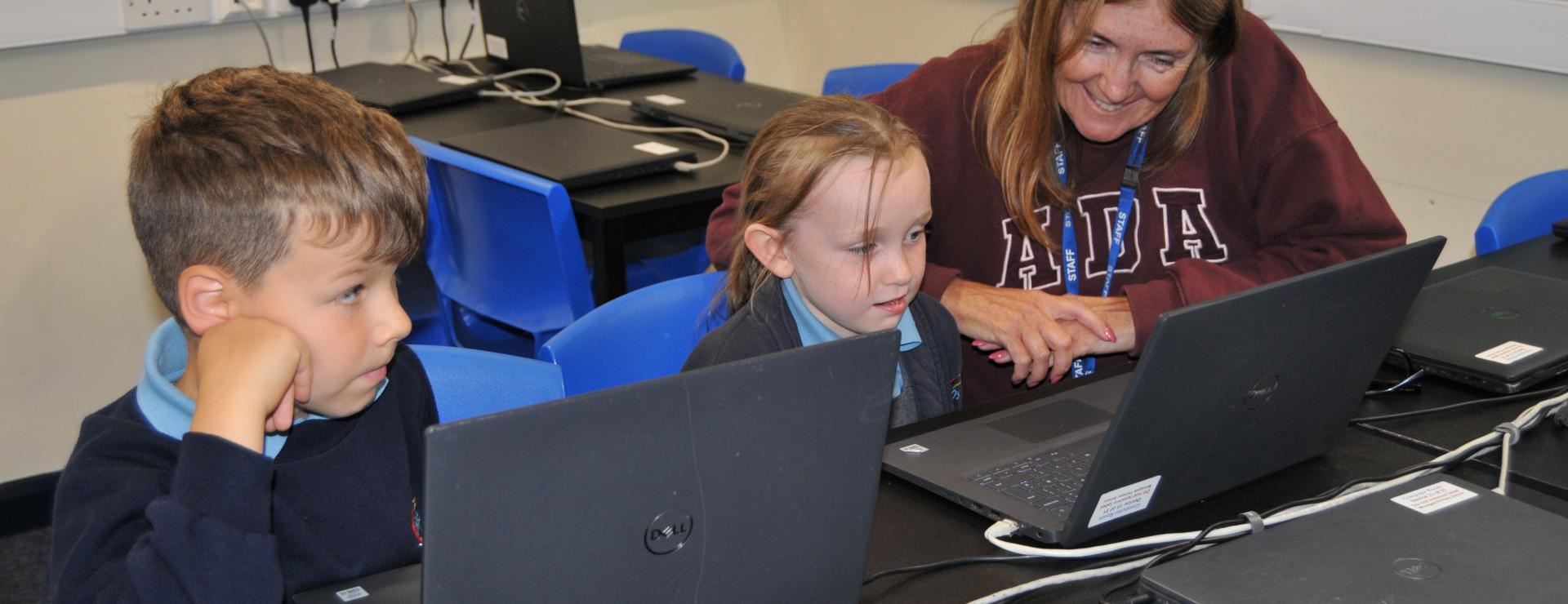Computing
“Computers are incredibly fast, accurate, and stupid. Human beings are incredibly slow, inaccurate, and brilliant. Together they are powerful beyond imagination.”
Albert Einstein, Physicist
At Mossgate, our computing curriculum aims to prepare our children for a constantly changing technological world driven by the internet and mobile devices. Our progression of knowledge and skills has been organised into three different themes:
- Online Safety - across eight aspects, our curriculum provides the knowledge, understanding and skills to balance the benefits offered by technology with a critical awareness of their own, and other’s, online behaviour and develop effective strategies for staying safe and making a positive contribution online.
- Computer Science - our children learn how to use logical reasoning to explain how simple programs work and use this to create and find errors within their own algorithms and programs. They also develop an understanding of how devices work and how they can be connected to form networks.
- Information Technology - our children develop their knowledge and skills across different hardware and software to design, create and evaluate.
Our computing curriculum has been designed using the National Centre for Computing Education’s ten strands of computing to ensure comprehensive coverage of the subject. Our spiral curriculum ensures the knowledge, skills and understanding are built upon from one year group to the next, which reduces the amount of knowledge lost through forgetting and ensures that connections are made in consecutive years. The table below shows how the ten strands are mapped across our three computing themes.
|
1. Online Safety |
2. Computer Science |
3. Information Technology |
||
|
Coding |
Computer Systems and Networks |
Creating Media |
Data and Information |
|
|
See online safety information below and key learning |
Algorithms: Be able to comprehend, design, create, and evaluate algorithms Programming: Create software to allow computers to solve problems |
Computer systems: Understand what a computer is, and how its constituent parts function together as a whole Computer networks: Understand how networks can be used to retrieve and share information, and how they come with associated risks |
Creating media: Select and create a range of media including text, images, sounds, and video |
Data and information: Understand how data is stored, organised, and used to represent real-world artefacts and scenarios |
|
These strands run across all units: Safety and security: Understand risks when using technology, and how to protect individuals and systems Design and development: Understand the activities involved in planning, creating, and evaluating computing artefacts Effective use of tools: Use software tools to support computing work Impact of technology: Understand how individuals, systems, and society as a whole interact with computer systems |
||||
Our computing curriculum has been written to support all children. Each lesson is sequenced so that it builds on the learning from the previous lesson, and where appropriate, activities are scaffolded so that all pupils can succeed and thrive. Exploratory tasks foster a deeper understanding of a concept, encouraging children to apply their learning in different contexts and make connections with other learning experiences.
Formative assessment opportunities are built into all lessons to ensure that misconceptions are recognised and addressed and vary from teacher observation or questioning, to marked activities. These assessments are vital to ensure that lessons are adapted to meet the needs of learners.
Computing is intrinsically linked to technology and therefore requires that children experience and use a range of digital tools and devices. At Mossgate, children have planned opportunities to use a range of digital devices: laptops, iPads, data loggers, floor robots and microcontrollers. Children will also use a variety of software on both laptops and iPads. With both hardware and software, the primary consideration is always how the tool will best allow children to meet the learning objectives and support their learning.
In designing our computing curriculum, we have consuted and adapted materials from a range of computing associations and organisations.
 |
 |
 |
“Everybody should learn to program a computer, because it teaches you how to think.”
Steve Jobs, former CEO and creator of Apple
Online Safety Curriculum
At Mossgate, we believe strongly that children have the right to enjoy childhood online, to access safe online spaces, and to benefit from all the opportunities that a connected world can bring to them, appropriate to their age and stage. As computer users and educated citizens, we want our children to live knowledgeably, responsibly and safely in a digital world.
Our curriculum provides the knowledge, understanding and skills to balance the benefits offered by technology with a critical awareness of their own, and other’s, online behaviour and develop effective strategies for staying safe and making a positive contribution online. It highlights what a child should know in terms of current online technology, its influence on behaviour and development, how to get support, and what skills they need to be able to navigate it safely.
We recognise that children’s online activity and behaviour can be different both within and across an age range. Our curriculum is flexible and adapts in order to support learning that is relevant to children’s online behaviour and experiences and matched to their readiness for new learning.
Our online curriculum has eight key strands, which teaches the children about:

Lessons ensure that children are provided with honest and useful information to shape thinking and challenge misconceptions and key questions encourage children to discuss and debate online safety themes.
Mr Smith - Computing Subject Leader
09.12.22
